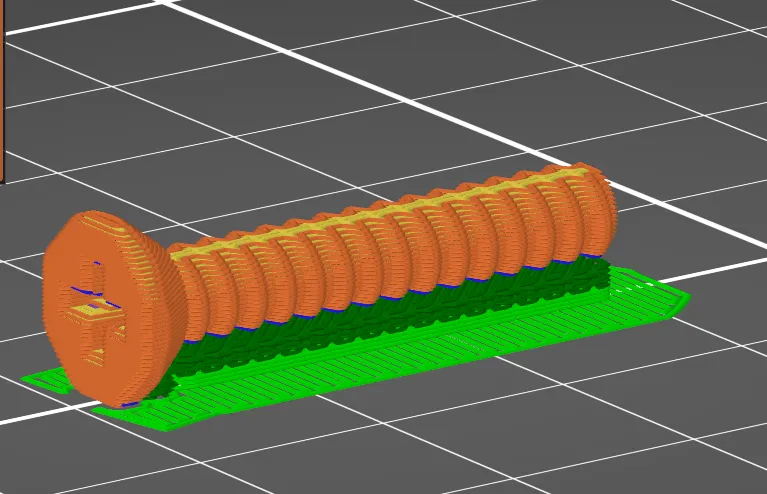If you wanna print it yourself, the model is here: https://www.printables.com/model/1348194-4n-threaded-flat-head-screws-and-nuts-10-32-equiva
Design to be a drop in replacement for 10-32 screws with a much, much higher pitch. These screws are extremely easy to print, is reliable enough that it can hold some weight.
If you wanna print this yourself, you need to make sure that the screw is sideways, so if it breaks it’s no on the layer lines.

Using them in my own prints which had metal screws and they are holding quiet well.


Just an FYI if you’re not familiar with American screw sizes, calling this a 10-32 equivalent is probably going to confuse come people.
The naming convention used for screws in America includes the shank diameter and the pitch of the thread in threads per inch (TPI)
So a 10-32 in a #10 diameter screw with 32 threads per inch
Below about ¼ inch diameter, the American system usually uses that numbered system, a #10 screw is .190 inches or roughly 3/16
For larger diameter screws they usually just use the nearest fractional equivalent instead of the screw number, so a ¼-20 is roughly ¼ inch (actually .242in/ or #14) diameter and has 20 TPI
Most sizes have a standard coarse and fine thread, for #10 32TPI is the fine thread, and 20TPI is the coarse thread
Little back-of-the-envelope math that I’m not super confident in, this would be something like a 10-16 screw. You might want to rename it or add a note to that effect, or maybe call it something like a #10 extra coarse thread.
I don’t know much, other than I have a box of them at home which I used for my older designs, and kept with since I could buy them cheap enough in bulk.
Wanted to make them out of plastic because I wanted to save some costs and this is what I got. I also find it funny that I got the thread which has a 15.875TPI at the end of the day. Half of what I am use to.
Number series machine screws get their designations from wire gage sizes that they were made from. Which traces back to several different British thread systems waaayyy back in the day. While there is no hard and fast rule, the number series screws are sometimes referred to as ‘Machine screws’ while fractional series fasteners are referred to as ‘Bolts’. No one knows why, and Whitworth is dead. (Toolmaker humor).
All actual diameters of screws are a bit under nominal for external and a bit over size nominal for internal. This is the clearance needed to make a screw and nut fit together. This all applies to metric thread fasteners also. Thread fit classes are a story for another day.
I’m not sure if the wire gauge thing is right, unless you’re talking about a different system than I’m familiar with, because with wire gauge smaller number=bigger wire, and with screw sizes smaller number=smaller screw
Also just my 2¢ on “machine screw” vs “bolt” as a casual tinkerer with various things held together by different types of threaded fasteners.
Generally speaking if it’s got a hex head or nut that I’m using a wrench to tighten, it’s a bolt
If it’s got some sort of hole (or God forbid a slot) that I’m going to use some sort of a driver (for the purposes of this, an Allen “wrench” is a driver) to tighten, it’s a screw.
And of course everything gets really murky when we start talking about things like sheet metal screws, lag bolts/screws, masonry screws, etc.
@Fondots @Bluewing especially since the terminology is different in different dialects of English. I think what you call lag bolts might be coach bolts over here.
Lag bolts are more like a big wood screw, what you call coach bolts seem to be what we call carriage bolts